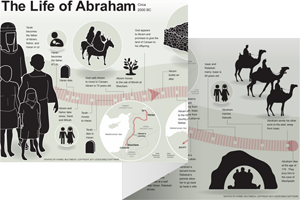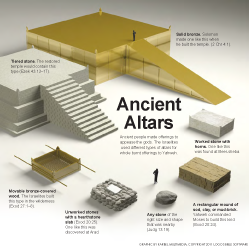12:1–9 The narratives of chs. 12–50 tell the story of Israel’s patriarchs: Abram (later called Abraham) and the three generations after him. In vv. 1–3, Yahweh calls Abram to leave his home and set out for an unknown land. By following Yahweh’s call, Abram demonstrates his trust in Yahweh’s promise to bless him and make him a great nation. The patriarchal narratives center on Yahweh promises to Abram in vv. 1–3 for offspring, land, and blessing. |
12:1 said to Abram Since the biblical genealogies indicate that Abram is the 10th generation from Shem, the son of Noah, it has been 10 generations since Yahweh spoke directly to anyone according to the biblical account. Previously, God gave humanity a blessing and promise after the flood. Now, after the judgment of the Tower of Babel (11:1–9), God speaks a blessing to the world again through Abram.
is the 10th generation from Shem, the son of Noah, it has been 10 generations since Yahweh spoke directly to anyone according to the biblical account. Previously, God gave humanity a blessing and promise after the flood. Now, after the judgment of the Tower of Babel (11:1–9), God speaks a blessing to the world again through Abram.
Go out from your land Abram is living in Haran in northwestern Mesopotamia. Yahweh’s command that Abram go is followed by three details: Abram is to leave his country or land, his birthplace or homeland, and his father’s household. The list increases in intimacy and importance.
relatives The Hebrew word used here, moledeth, can refer to someone’s native land (Ruth 2:11; Jer 22:10), though it sometimes refers to relatives or children (Gen 43:7; 48:6). In this context, a reference to “birthplace” makes the most sense because the extended family is subsumed under the following reference to “father’s house.”
the land Referring to the land of Canaan (v. 5). This is the first of three promises to Abram.
12:2 I will make you a great nation Yahweh’s second promise to Abram refers to a miraculous multiplication; Abram and his wife are simply two people and past childbearing age (compare Isa 51:2).
I will make your name great This third promise of Yahweh to Abram is a promise of renown and reputation, but primarily relates to material blessing, as Deut 7:13–14 indicates.
12:3 I will bless those who bless you God’s promise to bless and support Abram’s line shows a shift in His relationship with humanity. He now focuses on a chosen people.
12:4 Abram went out Abram responds to God’s command with immediate action. His faith is demonstrated through action, not speech.
Lot Lot is Abram’s nephew (Gen 11:27).
from Haran The town where Abram and his family have settled in northwestern Mesopotamia. See note on 11:31.
12:5 to the land of Canaan Refers to the land along the eastern shore of the Mediterranean Sea, all the way north to modern Lebanon and Syria, and inland to the boundary of the Jordan River.
The region of Phoenicia and Syria-Palestine. It was actually a geographic term, not an ethnic one, but the ot writers employed “Canaanites” |
12:6 Shechem This later becomes a sacred site commemorating the appearance of Yahweh to Abram, who builds an altar there (v. 7).
the Oak of Moreh A place of sacred significance since Yahweh appears to Abram here and reveals that he has arrived in the land to which Yahweh originally sent him (Gen 12:7).
Canaanites Refers generically to pre-Israelite inhabitants of the promised land.
12:7 appeared Other passages note Yahweh appearing visibly—even embodied—to Abram (ch. 18). The appearance to Abram marks the continuation of an overarching motif in both Testaments—that God or an angelic figure often visibly appears to those chosen to be His representatives and specifically prophets (20:7).
your offspring The Hebrew word used here, zera', often translated “offspring” or “seed,” represents an important element of Yahweh’s promise to Abram: The land of Canaan is promised to his descendants. The primary conflict of the Abraham narrative centers on this promise of offspring in tension with Sarai’s barrenness (see 11:30 and note).
this land Yahweh confirms to Abram that he is standing in the promised land.
he built an altar there to Yahweh Abram did not use an existing altar to another deity.
 Altars in the Old Testament Table
Altars in the Old Testament Table
12:8 Bethel Bethel means “house of God”; it would become a sacred site for Israelites (see 1 Kgs 12:26–29).
12:9 toward the Negev Refers to southern and southeastern Judah around Beer-sheba.
12:10–20 Abram’s trek through southern Canaan (the Negev) results in him journeying to Egypt to avoid a severe famine. Yahweh does not instruct Abram to leave Canaan, but neither does He explicitly demand that he stay. This is different than Yahweh’s instructions to Isaac not to leave Canaan during a famine in Gen 26:2–6. |
12:10 famine was severe The narrator emphasizes the severity of the famine that drives Abram to Egypt, perhaps recognizing the incongruity between God’s command to Abram to go to Canaan and Abram’s decision to travel to Egypt.
 Famines in the Bible Table
Famines in the Bible Table
Famines in Genesis | |
Abram and Sarai Travel to Egypt | |
Isaac and Family Settle in Gerar | |
Joseph’s Family Follows Him to Egypt | |
12:11–16 Abram fears that Sarai’s beauty will lead the Egyptians to procure her for Pharaoh at any cost. He also believes he will be killed if the Egyptians learn of their marriage, so he has Sarai tell a half-truth about their relationship. Abram’s fears are well-founded—the Egyptians kidnap Sarai. |
12:13 say you are my sister Denotes a sibling relationship, which was true in a way (see 20:12).
12:15 the officials of The Hebrew word used here, sar, refers generically to a wide variety of officials, including military officers, royal counselors, and members of the ruling classes.
was taken to the house of Pharaoh This indicates that Sarai becomes a member of Pharaoh’s harem. Unlike the similar story in 20:1–18, this text does not explicitly indicate that Pharaoh does not have sex with Sarai (compare 20:3–4). Later, Pharaoh acknowledges that he has taken Sarai as a wife (v. 19).
12:16 female slaves, female donkeys, and camels Abram profits considerably from his ruse. The Pharaoh’s gifts to Abram may have been a type of dowry in exchange for taking Sarai into his harem.
12:17 Yahweh afflicted Pharaoh and his household with Instead of chastising Abram, Yahweh punishes Pharaoh.
12:18 Pharaoh called for Abram In the similar account in ch. 20, God informs the king of the problem (20:3–7).

|
About Faithlife Study BibleFaithlife Study Bible (FSB) is your guide to the ancient world of the Old and New Testaments, with study notes and articles that draw from a wide range of academic research. FSB helps you learn how to think about interpretation methods and issues so that you can gain a deeper understanding of the text. |
| Copyright |
Copyright 2012 Logos Bible Software. |
| Support Info | fsb |
 Loading…
Loading…


 Canaan
Canaan 

